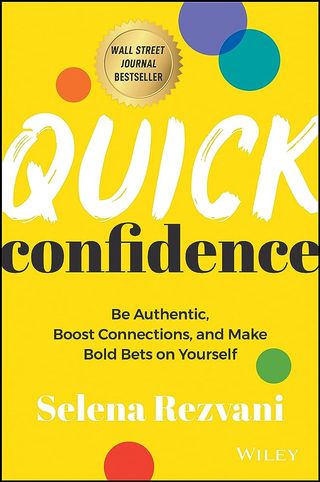Exactly How to Talk to Higher-Ups
The way you communicate with executives can significantly impact your career, says Selena Rezvani, author of 'Quick Confidence.'


The feeling of your throat closing up. Beads of perspiration on your forehead. Your heart pounding in your chest. Have you ever felt these things when approaching an executive or higher-up?
Here’s the thing: The way you communicate with executives can significantly impact your career. In fact, a single conversation may be the only thing standing between an expanded role, a visible opportunity, or locking in a promotion.
So often, when it comes to interacting with VIPs and influential types, it’s not who you know, but who knows you.
Although that might sound intimidating, I’m here to assure you that you have more control than you think in these high-stakes interactions.
Speaking to executives with confidence is a skill that you can learn with experimentation and practice. I know this to be a fact because I’ve done it myself. Throughout my career, I have interviewed over 75 C-level executives for my books and columns and attended conferences packed with highly accomplished CEOs…and I have made plenty of mistakes when talking to them.

Years ago, I went to a leadership lunch that was crowded with highly accomplished individuals. I made my way in there, bright-eyed and bushy-tailed, excited to meet powerful people and learn from them. But to my intense disappointment, I found most of the people in the room to be closed off. They would literally turn away from me to talk to someone they knew instead.
It felt awful. I felt like I didn’t belong in a place I so badly wanted to be.
Stay In The Know
Marie Claire email subscribers get intel on fashion and beauty trends, hot-off-the-press celebrity news, and more. Sign up here.
The worst part is that I started to play small, to shrink. I clung to a corner of the room, darting my eyes up nervously, and found myself “low talking” in the few interactions I did have.
I have since learned from my mistakes and found better approaches to my communication, so I can have mutually beneficial conversations with high-powered people I respect. Now when I enter these situations, I feel assured that I do belong. Just as much as any of them.
Here are four mistakes I hope the next generation of employees will avoid when speaking to executives:
Hurrying Through Conversations
Opening a conversation with something like, “I know you’re super busy so I’ll just make this really quick!” is usually an attempt at showing that you respect your higher-up’s time, and you don’t want to take up too much of it. However, it seeps your power, and the strength of what you have to say when you speed through your words as though you are a burden.
Your time and words have value, just like any executive’s does.
The Solution: If you need to pop in to ask a “quick” question or make a statement, skip the preface, and jump into what you need to say. For example, you can simply say, “Hey, I have two parts of the campaign I’d like to review together. Is now a good time?”

Selena Rezvani's new book, Quick Confidence, helps you build concrete, actionable strategies to develop confidence and executive presence.
Apologizing Too Much
“I’m sorry to bug you, I just wanted to introduce myself...”
“Sorry, but can I ask one more question?”
“I’m sorry we couldn’t get to everything today - can we schedule a follow-up meeting?”
Over-apologizing at work can cause people to lose respect for you, damage your confidence, and make serious apologies seem less meaningful. Moreover, it communicates that an executive is doing you a favor. But let me make one thing clear: you are not borrowing their time!
The Solution: Try this on for size instead: next time you’re tempted to apologize for needing a moment of an executive’s time, acknowledge them quickly instead.
“I’m so glad we could find a time to meet. It would be great if we address A, B, and C today.”
“Thanks for bringing that up. That actually relates to XYZ, which I’d like to look at next.”
“Thank you for your insight. I have one more question.”
Carrying Yourself Like a Minion to Royalty
When you picture a high-powered executive, you may not exactly envision the world’s most approachable person. Pop culture may be to blame here. See: Horrible Bosses, The Devil Wears Prada, 9 to 5, and The Wolf of Wall Street.
But when it comes to speaking to higher-ups, they only have as much power as you give them.
The Solution: Talk in a peer-to-peer manner that is respectful yet doesn’t play up a power differential. Behave as though you’re needed and belong in that room. Scratch that—as though you 400 percent belong!
Doubting your worth
Unfortunately, due to cultural norms and gender bias, women are raised to constantly doubt themselves. As a result when we enter the workplace, many of us suffer from imposter syndrome, which is defined as "an internal experience of intellectual or professional inadequacy—self-doubt resulting in anxiety and a fear of being found out to be a fraud." In fact, a study found that 75 percent of women across industries experience this. But as Ruchika Tulshyan and Jodi-Ann Burey write in HBR, it's important to note it's unfair to keep diagnosing women with this condition, and to remember that imposter syndrome is the result of systemic bias and exclusion against women and other groups.
The Solution: Because gender bias is such a systemic workplace issue, we in the meantime have to adopt our own mental, physical, and interpersonal routines that will help lock in our new and confident persona for lasting change. When you affirm that belonging for yourself, it sends a powerful signal to your body. You sit up straighter, you speak with more conviction, and you’re willing to show more of who you are authentically. So, make a point to “big up” and be conspicuous, even if you’re intimidated by your surroundings.
Keep these tripwires in mind next time you’re in the presence of someone you perceive as a VIP. The techniques I shared will give you a personal boost of confidence, help further your career, and can even rebalance power dynamics in the moment. Remember, nothing teaches other people how to treat you like your own example. Endorse yourself, and others will follow.

Selena Rezvani is a recognized consultant, speaker, and author on leadership. She’s coached and taught some of the brightest minds in business, addressing audiences at Microsoft, The World Bank, Under Armour, HP, Pfizer, Harvard University, Society of Women Engineers, and many others.
-
 Zendaya Delivers a Podium-Worthy Pre-Olympics Gown
Zendaya Delivers a Podium-Worthy Pre-Olympics GownShe's shining brighter than the City of Lights.
By Halie LeSavage Published
-
 'Love Island USA' Star Kenny Rodriguez Is Not "Playing Around" with His and JaNa Craig's Romance Outside of the Villa
'Love Island USA' Star Kenny Rodriguez Is Not "Playing Around" with His and JaNa Craig's Romance Outside of the VillaThe prince and princess of season 6 have remained the cutest couple since filming wrapped.
By Quinci LeGardye Published
-
 So Many Celebrity Beauty Favorites Are in Nordstrom's Anniversary Sale
So Many Celebrity Beauty Favorites Are in Nordstrom's Anniversary SaleShop Jennifer Lopez, Meghan Markle, and Kaia Gerber's beloved picks.
By Julia Marzovilla Published